'Stop the pain': George Floyd's brother testifies on policing reform
Philonise Floyd appeared before the House Judiciary Committee.
In a dramatic moment in the crisis over race and policing, George Floyd's brother, Philonise Floyd, testified Wednesday before the House Judiciary Committee on reform proposals, following his death in the custody of Minneapolis officers that triggered national outrage.
Asked what he planned to tell the committee as he arrived on Capitol Hill, Floyd said, "Justice for George."
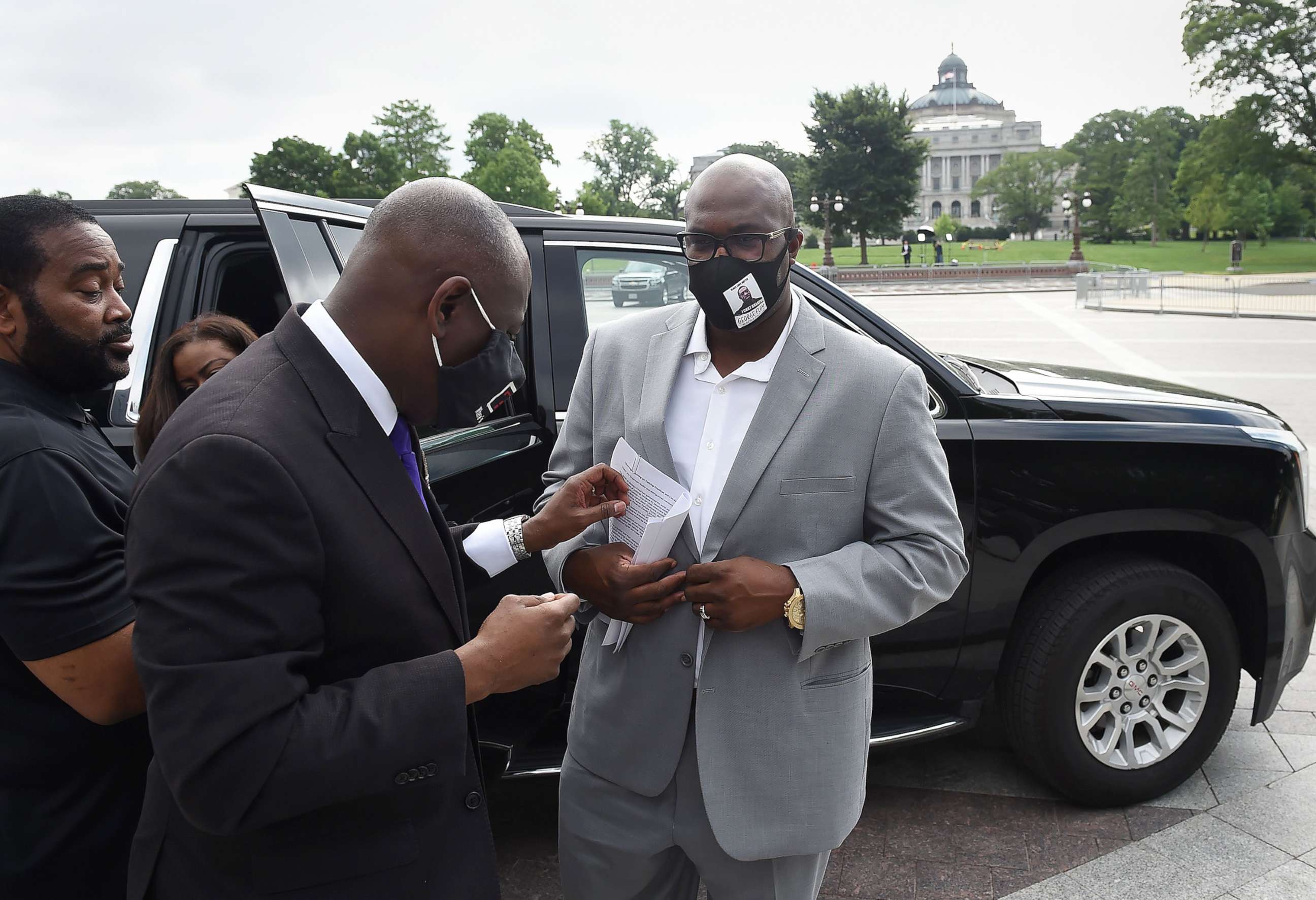
He later told lawmakers, "I couldn't take care of George the day he was killed, but maybe by speaking with you today, I can help make sure that his death isn't in vain. To make sure that he is more than another face on a t-shirt. More than another name on a list that won't stop growing."
Also testifying were Floyd family's lawyer Benjamin Crump, a former Secret Service agent and the sister of a federal law enforcement officer killed in the line of duty.
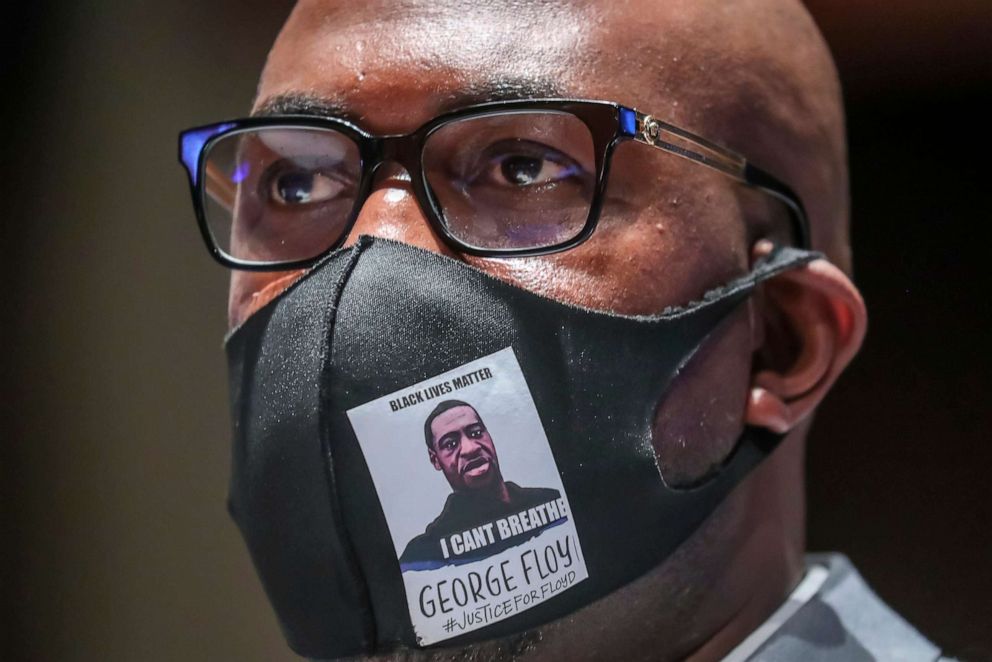
Here is how the hearing unfolded:
Philonise Floyd visits 'Black Lives Matter Plaza' near White House
After the hearing ended, Philonise Floyd visited a two-block stretch of road near the White House that has been named "Black Lives Matter Plaza" and where the city painted a mural on the street.
He was first spotted at the steps of St. John's Episcopal Church, where the president had staged a photo op while holding a Bible last week.
A crowd of what looked to be a few hundred demonstrators congregated around Floyd, family attorney Benjamin Crump and Rep. Sheila Jackson Lee, D-Texas.
Crump, speaking into a bullhorn, led chants of "Put your fists in the sky ... raise 'em up, raise 'em high," and then, "George Floyd, Jr."
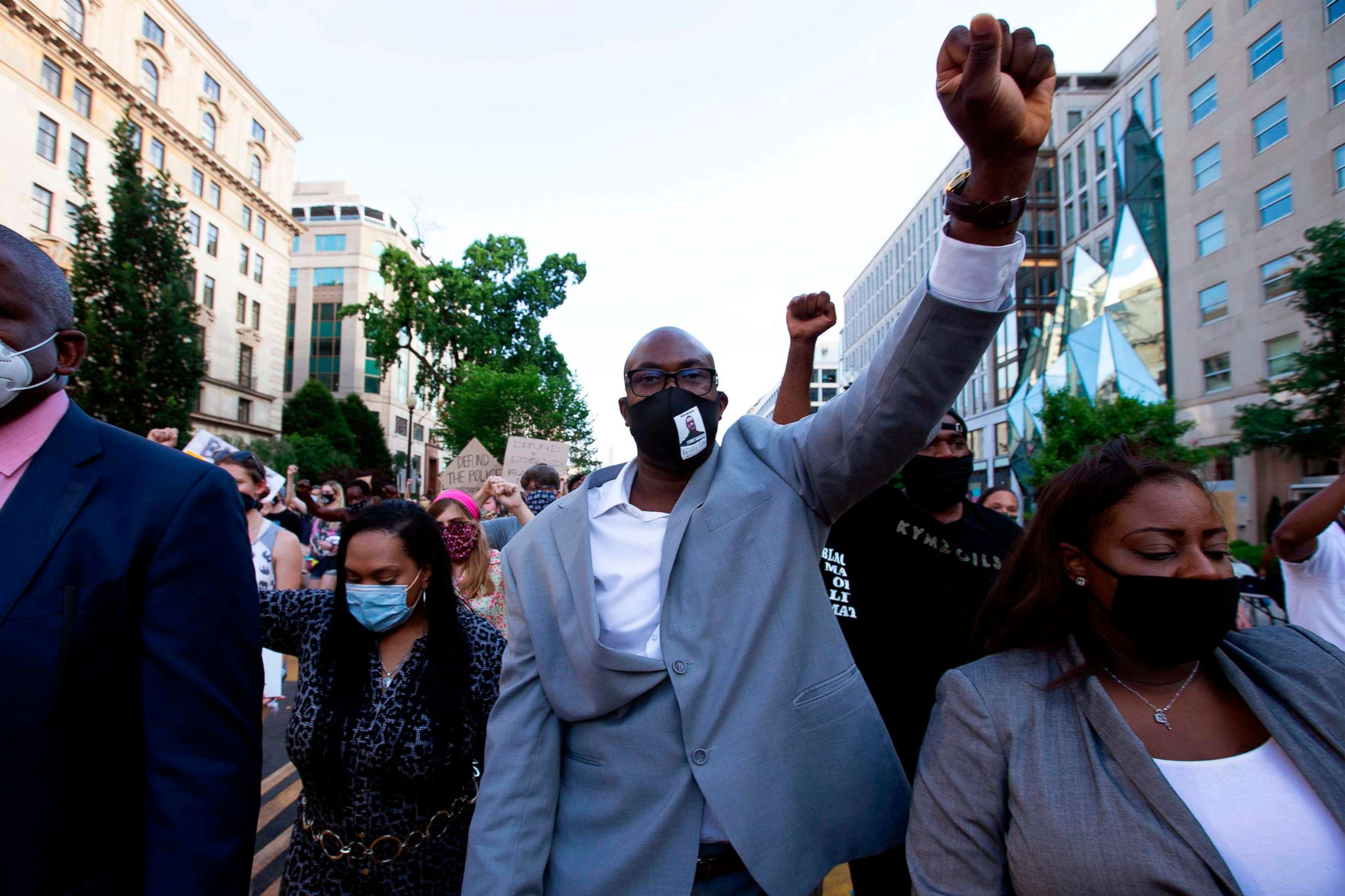
The group stopped at the northern edge of the Black Lives Matter mural and Crump handed the bullhorn to Floyd.
"Thank y’all so much. Y’all been out here protesting doing everything we needed to do. ‘Cause black lives matter -- our lives matter. We will be here all day, all night long -- in it together trying to get our government the way it needs to be," he said. "Thank y’all so much."
Amid chants of "black lives matter," Floyd, Crump and the rest of their group got into their vehicles and left.
-- ABC News' Benjamin Siu
4:20 p.m. McBath, whose son was murdered, makes emotional plea to colleagues to 'speak up'
Rep. Lucy McBath, D-Ga., in an emotional statement, talked about how her own son, Jordan, was shot and killed by a white man in Florida following an argument at a gas station in Florida about loud music.
"I feel the pain experienced by too many families every single day and every single day, it's like a sucker punch in my heart and my gut. Because when is it going to stop?" she said.
"We come to this hearing today, as a result of deep morally painful wounds and events that happen in this country, again and again and again," she said, bringing up Ahmaud Aubrey, who police say was pursued and killed by three men in her district.
McBath also offered a plea to her colleagues to take action beyond the hearing room.
"I am begging you to stand in the gap. I am begging you to speak up. I'm begging you to be a part of solving the problems of all the young black men and women in this country that die every single day -- because if you do not, you are complicit," she said.
3:15 p.m. Philonise Floyd: 'They lynched my brother'
Rep. Eric Swalwell, D-Calif., asked Floyd directly what he wants the world to hear in the wake of his brother's death.
"Stop hiring corrupt police officers," Floyd began. "Because your heart has to be big if you're an officer."
"You're supposed to serve, and you're supposed to protect. I didn't see anybody protecting and serving that day, when my brother was on his front, hands behind his back. 'Please, please, please, I can't breathe,'" he said. "They lynched my brother. That was a modern-day lynching in broad daylight."
"They just dragged his body across the concrete. His lifeless body. Every day, I'm gonna have to live with that. My family is gonna have to live with that. His kids are gonna have to live with that," he added.
2:32 p.m. Philonise Floyd sobs for his brother, Angela Underwood Jacobs says she also is 'heartbroken'
Rep. Martha Roby, a Republican from Alabama, allowed Floyd and Underwood Jacobs to use the remainder of her question time to address the committee.
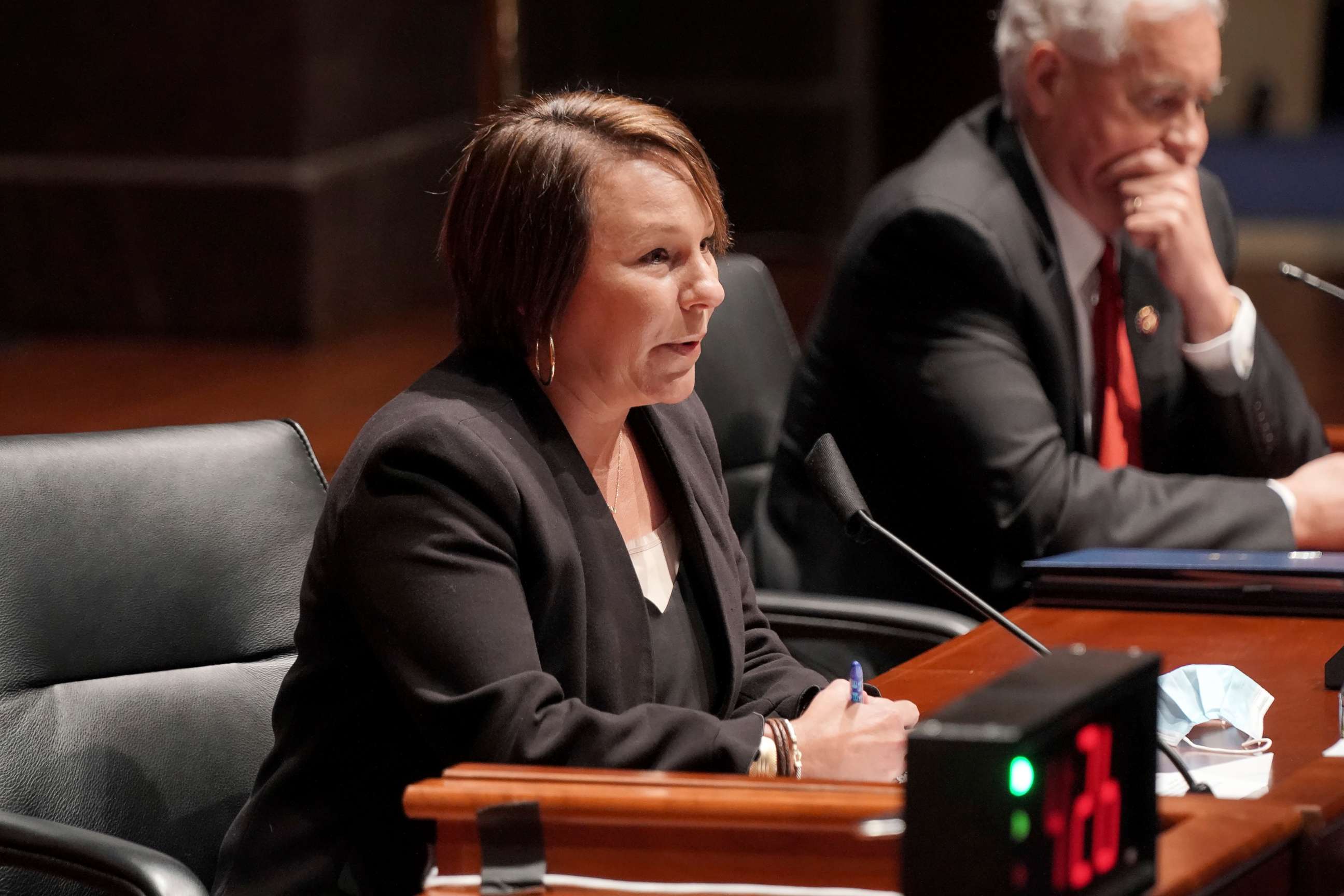
"Sitting here, coming to try to tell you all about how I want justice for my brother, I just think about that video over and over again. It felt like eight hours and 46 minutes," Floyd said. "Everyday just looking at him, being anywhere, that is all people talk about. The rest of my life, that is all I ever see. Somebody looking at the video."
Floyd grew particularly emotional when he noted about how Floyd's children also watched their father die on tape.
"Anybody with a heart, they know that is wrong. You don't do that to a human being. You don't even do that to an animal. His life mattered. All our lives matter. Black lives matter," Floyd said. "I just wish, wish I could get him back."
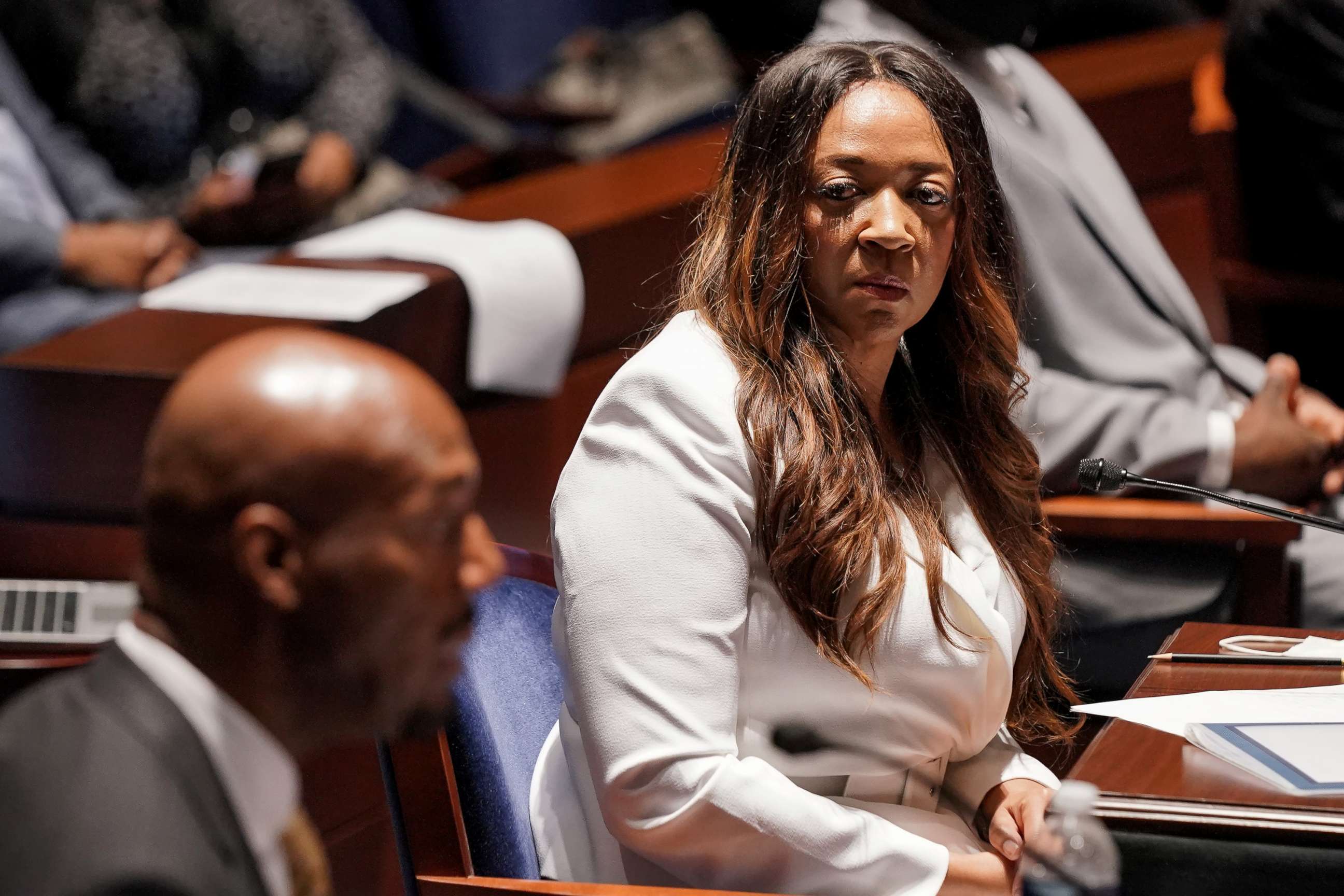
Underwood Jacobs, following Floyd, compared their two situations -- though her brother, a police officer, died in the line of duty, while Floyd's brother died in police custody.
"I didn't get a chance to say goodbye to my brother either before he was killed. I am also heartbroken for all of the other people that are in this country living every single day and feel unsafe just to drive to the store." she said. "I also have had the talk with my son."
"We sit here today at somewhat opposite ends of the spectrum, to a certain degree, but yet there is so much commonality amongst both of us. And the heartbreak, and the grief is unexplainable because it's very very hard to articulate, when your entire world has been turned upside down," she said.
"I'm wondering where is that, where's the outrage, for a fallen officer that also happens to be African American," Underwood Jacobs added.
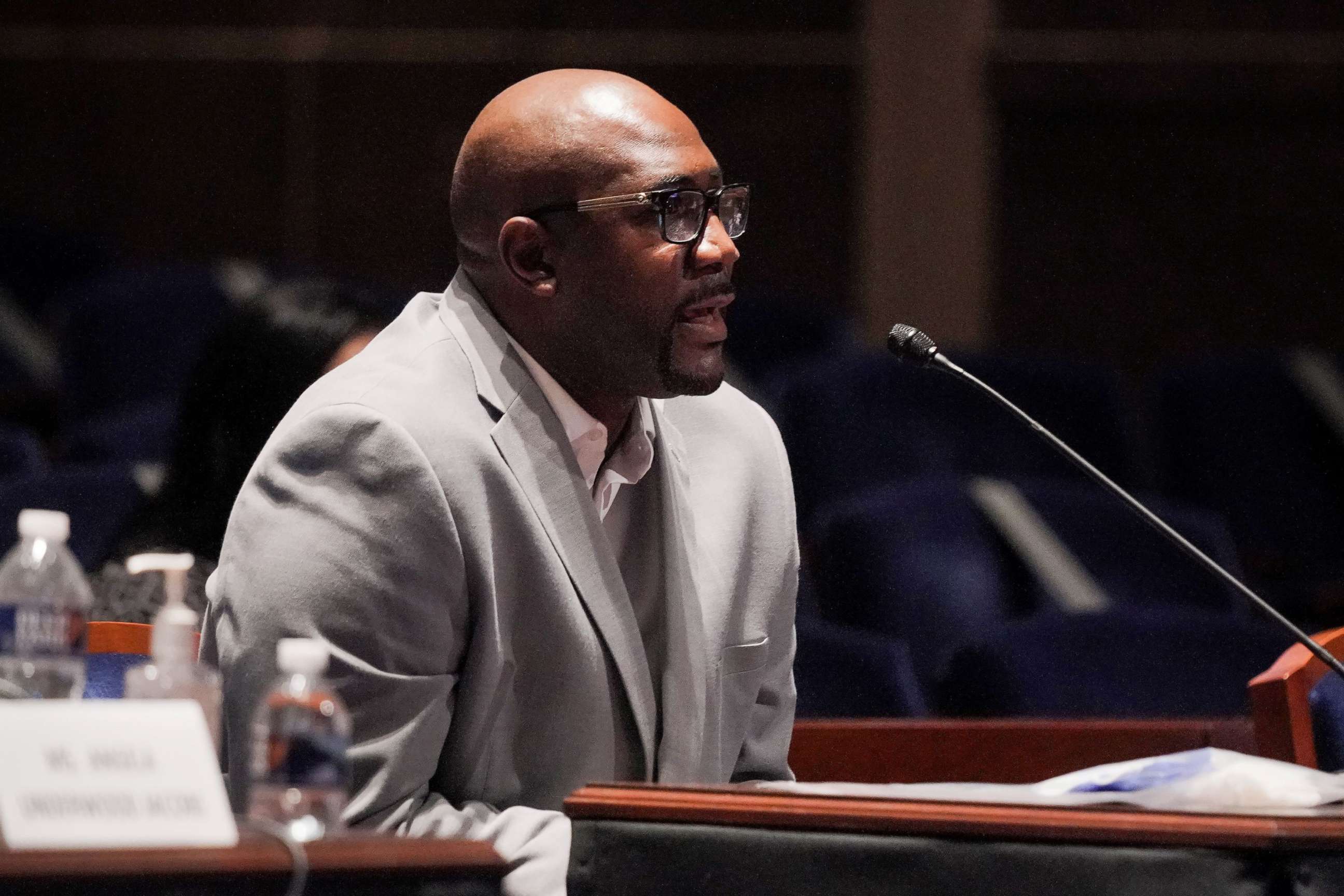
2:22 p.m. Crump predicts another man will die in police custody 'in the next 30 days' without reform
In an answer to Rep. Karen Bass, D-Calif., Crump predicted that another black man will die in police custody in the next month if there aren't accountability changes, specifically to qualified immunity.
"That's why nobody has ever held accountable when you think about that long list of Black Lives Matters names that we often recite to make sure that people know their lives mattered," he said.
"If there is no accountability, Congresswoman Bass, it will keep happening. And we pray that George Floyd is the last one, but if this great body doesn't act. It's going to happen again and I predict what's going to happen in the next thirty days," he continued.
He said it only seems to be an issue with law enforcement and not with other professions.
"It only seems to be the police that has this great authority. this power that we've given them, and it goes unchecked. Every other profession, you're kept in check by the laws that govern this but the courts have, I believe, constitutionally in many ways given police this absolute blanket immunity, especially when it comes to black and brown people being killed by police," he said.
"I mean, it's almost, you can count on one hand the people who actually go to jail for killing black people out of all those thousands of people," he said.
1:35 p.m. Floyd's brother: 'It has to be something to do with racism'
When Rep. Sheila Jackson Lee, D-Texas, asked Philonise Floyd if race played a part in his brother's death, he replied, "I believe, yes, ma'am, I believe that."
"George, wherever he goes, he impacts a place, he talks to a lot of people. He's just a gentle giant. So, at that club, and Mr. Chauvin worked there, I know that he knew him. Everybody knew him. The mayor knew him. Killed my brother just because he did not like him, and it has to be racist," he said.
"It has to be something to do with racism," he said.
Lawyer Benjamin Crump told lawmakers that police officers must be held accountable for their actions and that "qualified immunity" will only make the victim list grow longer.
"Immunity breeds impunity for these police," Crump said. "If they have this qualified immunity, we see no accountability."
Crump urged Congress to tackle the problem "like it's an epidemic on black people."
"It allows for all of those names -- all those Black Lives Matter names to keep adding up, adding up, adding up. So we need that there. We need the registry. We need to attack this like it's an epidemic on Black people, because that is what we see happening in our communities," Crump said.
Rep. Doug Collins, R-Ga., while acknowledging problems with qualified immunity, argued there were concerns with a full repeal.
"Have you considered the fact that some of these police officers out of fear of the rather litigious society we live in now unfortunately will now be afraid in the street to go and do their jobs and be proactive in communities that needed most?" Collins said. "Qualified immunity has issues. You can work around the edges, but the margins matter."
1:31 p.m. Sensenbrenner says there would be more racism without police calls on Democrats to do more on 'bad cops'
Rep. Jim Sensenbrenner, R-Wis., didn't ask any questions in his five minutes but briefly shared his condolences to Floyd's family before echoing other Republicans in dismissing any defunding the police and pointed to some "bad cops."
"I would submit to you that there will probably be more racism if people take the law into their own hands than if they relied on the police to investigate crimes and to protect the public," he said.
Sensenbrenner also called on Democrats to do more in getting rid of "bad cops" since he said they are tied more closely to unions.
"A lot of the police union activity that we have seen has been to protect bad cops and the police unions in this country. And my Democratic colleagues, you know have more friends and those unions then we Republicans do. You are going to have to step up to the plate and to be cooperative with communities and getting rid of the bad cops," he said.
"I see nothing wrong with having, you know, a bad cop database. But having a database isn't going to get somebody fired who ought to be fired. And the sooner we get the bad cops off the force," Sensenbrenner added. "The sooner there will no longer be any bad apples, spoil a whole barrel."
1:08 p.m. Floyd on reason for Chauvin's actions: 'It was personal'
After a break for lunch, the hearing resumed with Nadler asking Floyd if he could think of any reason an officer would need to hold a knee on his brother's neck for eight minutes. Floyd said that he thought it was "personal."
"Because they worked at the same place, so for him to do something like that, it had to be premeditated and he wanted to do it," Floyd said.
Raising what he said was Chauvin's record of misconduct, Nadler asked how Floyd felt when he learned of the officer's history.
"He should have been out of the force," Floyd said. "Any officer committed the act like that shouldn't be able to get a job in any county after they get fired."
11:30 a.m. Crump: U.S. has 'two systems of justice -- one for white Americans and another for black Americans'
Benjamin Crump, the civil rights attorney representing George Floyd's family, began his opening testimony with a wish.
"I know all the speakers have five minutes to speak, but I wish it was eight minutes and 46 seconds, not as a symbolic gesture, but as an actual exact time reference of how long, George Floyd, literally begged. He literally narrated a documentary of his death," Crump began.
"The death of George Floyd has galvanized the world and mobilized Americans to demand a more just system policing, because it's become painfully obvious that what we have right now are two systems of justice, one for white Americans and another for black Americans."
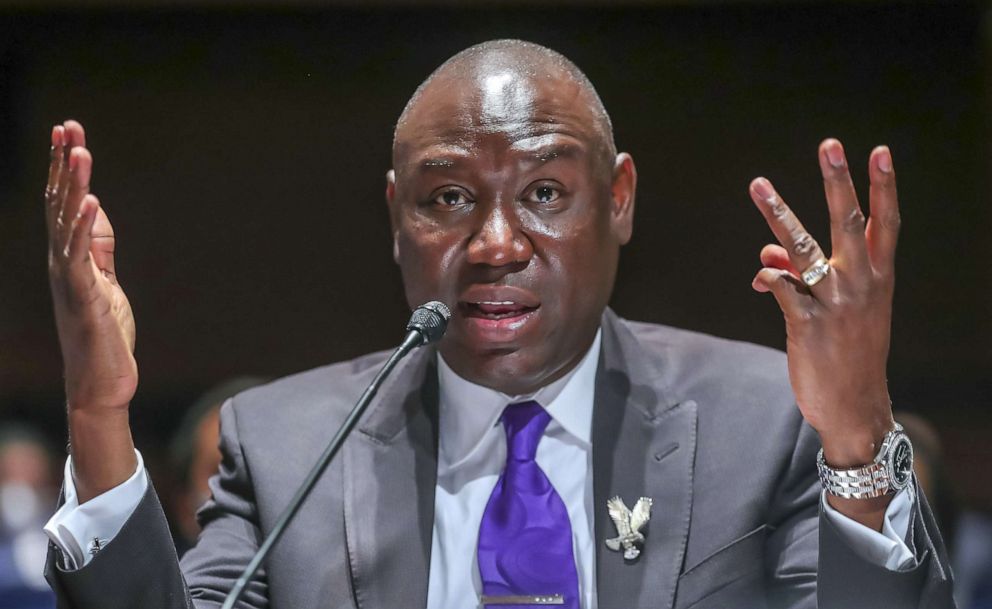
Crump also took the opportunity to say the names of others who, he says, have died at the hands of police officers.
"George is one in a long line of black Americans who end justly are killed at the hands of police or enjoys case at the knee of the police, including Breonna Taylor, Pamela Turner, Botham Jean, Michael Brown Stephon Clark, Eric Gardner, Tamir Rice, Philando Castile, Terence Crutcher, Laquan McDonald, just to name a few. And the list goes on and on," he said. "But it is important, Mr. Chairman, that we remember their names."
Crump recognized that law enforcement should be able to protect themselves and their communities.
"What we are witnessing throughout our country is not that. Americans are being tear gassed in the streets, hit with rubber bullets, shoved violently to the ground cracking their skulls against the pavement, beat bloody with batons and for what? For demanding justice for black Americans," he said. "Our rights are under attack in the broad daylight."
He called for a national standard for policing behavior "built on transparency and accountability."
Crump also emphasized that Floyd's family would likely not have seen accountably had his death not been captured on video.
"The advent of video evidence is bringing into the light what long was hidden. It's revealing what black Americans have known for a long, long time. That it is dangerous for a black person to have an encounter with a police officer," Crump said.
Crump presented a handful of concrete reforms to lawmakers: mandatory body cameras, appropriate level of force based on level of threat, banning restraints like chokeholds and strangleholds, and reforms to how qualified immunity is applied to police officers.
"If officers know they have immunity, they act with impunity. If officers know they can unjustly take the life of a black person with no accountability, they will continue to do so," he said. "That is what you saw in the eyes of Derek Chauvin with his hand casually tucked into his pocket as he extinguished the life of George Floyd."
"The founding fathers knew they had not built an infallible system, a faultlessly union, but they did task us with the perpetual duty to aim for it, a more perfect union of justice, liberty, resilience, hope, and compassion. We have to do better and we must strive to live up to those American ideals," he added. "We are better than this."
10:48 a.m. McCarthy introduces witness whose brother died in line of duty
House Minority Leader Kevin McCarthy made an appearance to introduce Angela Underwood Jacobs, whose brother, Federal Protective Services Officer David Underwood, known as Patrick, was shot and killed during recent protests and riots in Oakland, Calif.
"We pray that justice comes swiftly and completely for Pat, for George Floyd, and all victims of violence. Pat Underwood should be alive today. George Floyd should be alive today. David Dorn should be alive today. And so should countless others," said McCarthy, mixing in fallen police officers and those who have fallen at their hands.
"And though we cannot bring them back, we can learn from their lives and deliver the justice and change they deserve," he said.
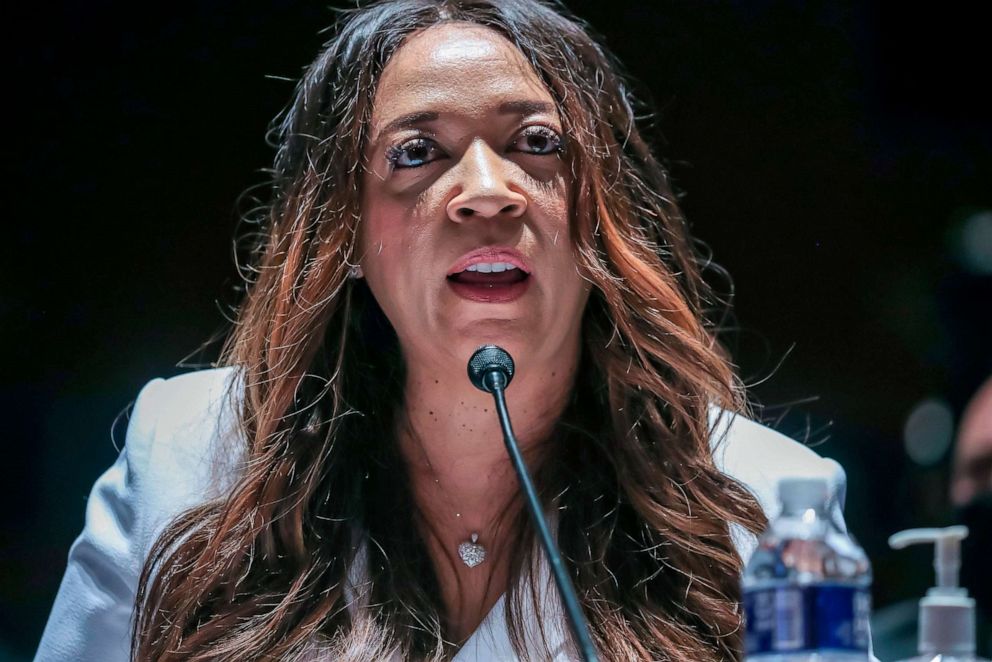
Underwood Jacobs, the first African-American woman elected to Lancaster City Council, used her opening statement to denounce the movement to defund the police.
"Police brutality of any kind, must not be condoned. However, it is blatantly wrong to create an excuse of discount of discrimination and disparity to loot and burn our communities to kill our officers of the law," she said. "It is ridiculous solution to proclaim that the funding police departments, is a solution to police brutality and discrimination."
"I want you, as our representatives in Congress, to make a change, so that no one ever has to wake up to the phone call that I received telling me that my brother was shot dead and murdered," she said.
With emotion in her voice, Underwood Jacobs then called on Americans to respond with "kindness and love."
"My wish is for us to live and live without fear and discrimination. Do not simply tolerate your neighbor, but strive to understand one another," she added.
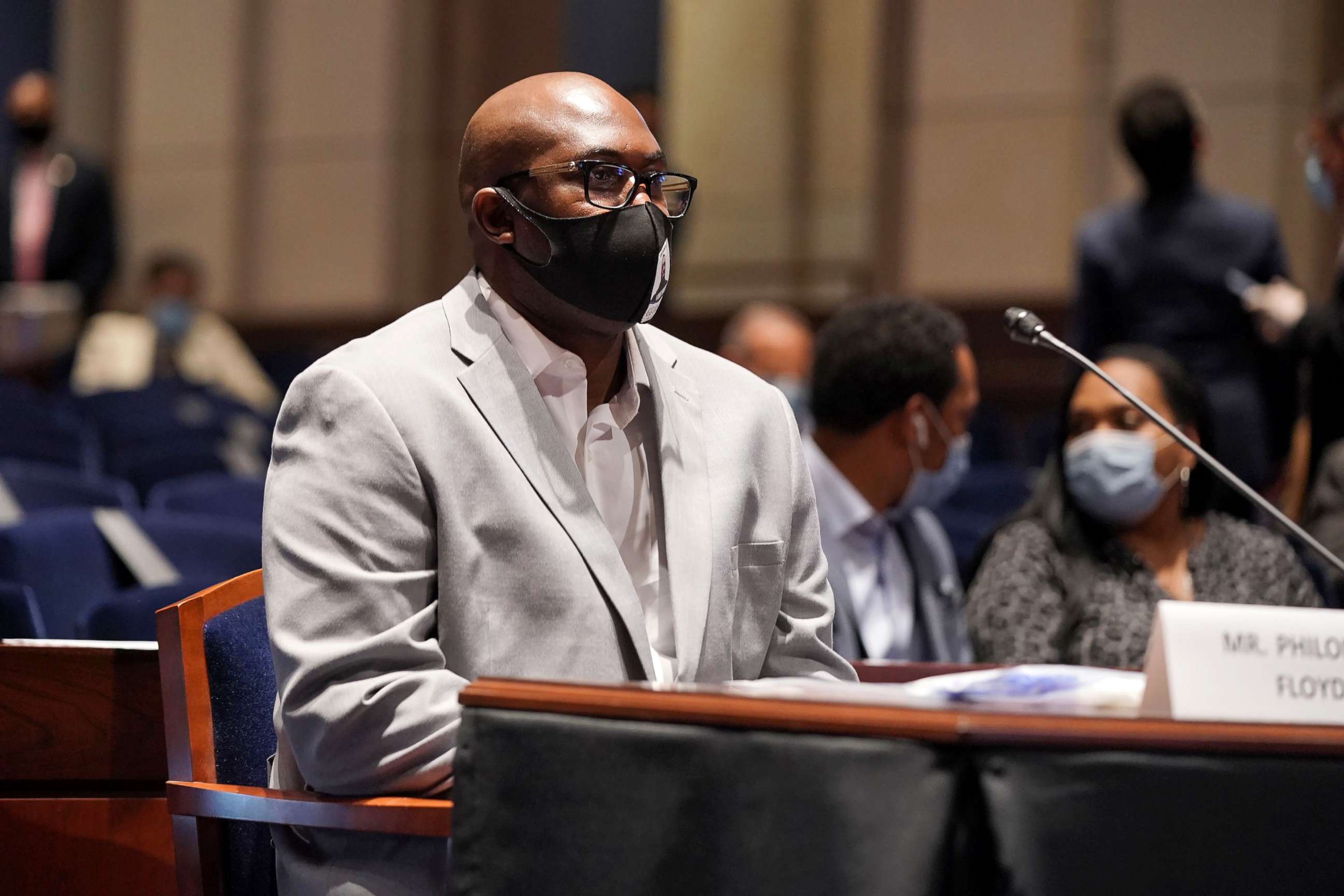
10:36 a.m. George Floyd's brother, Philonise: 'Stop the pain'
In a powerful and emotional opening statement, Philonise Floyd called on lawmakers to make law enforcement "part of the solution, not the problem" so his brother's death isn't in vain.
"I couldn't take care of George the day he was killed, but maybe by speaking with you today, I can help make sure that his death isn't in vain. To make sure that he is more than another face on a t-shirt. More than another name on a list that won't stop growing," he began.
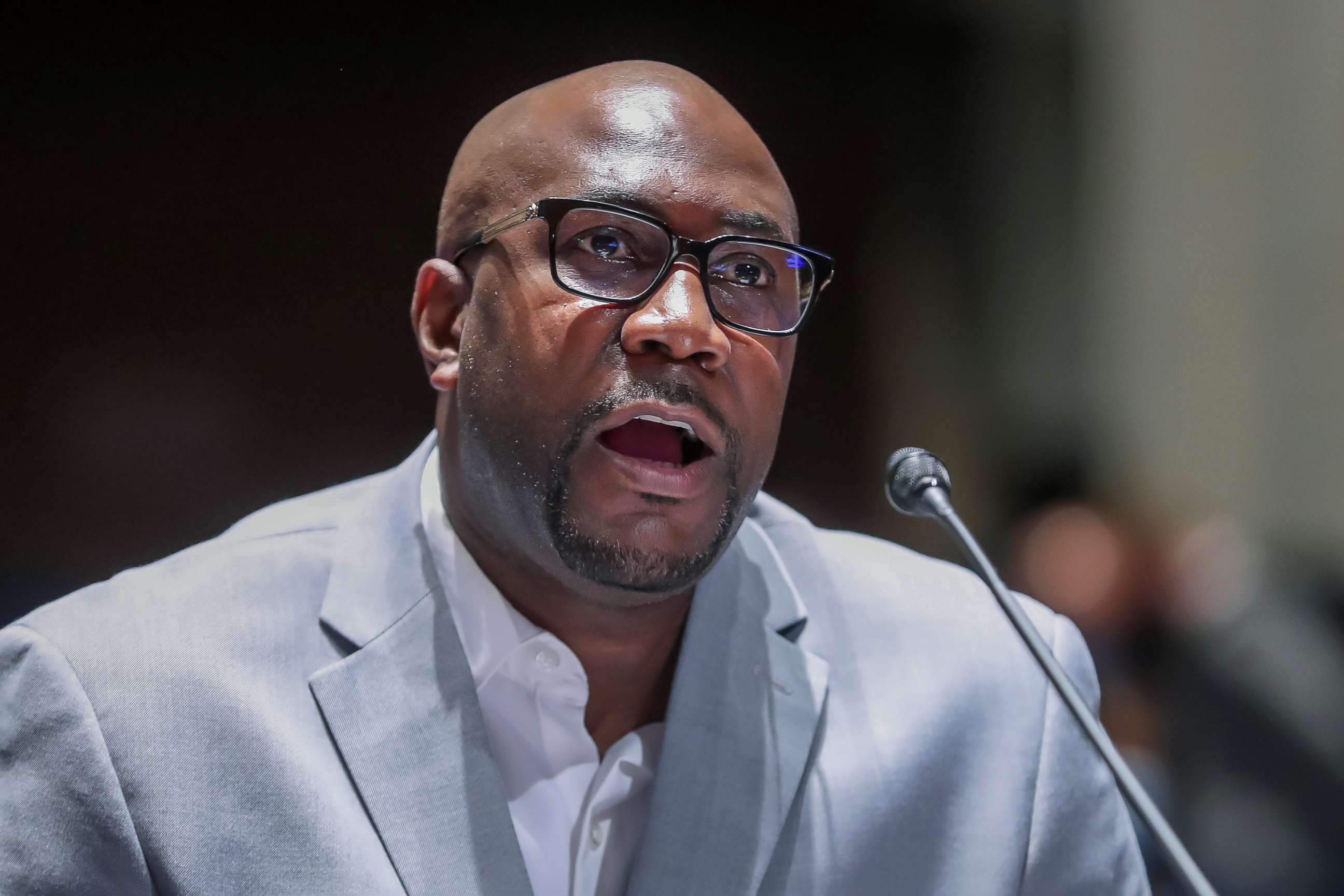
Floyd went on to attempt to describe what it felt like watching the video of his brother's death, saying, "George's calls for help were ignored."
"I can't tell you the kind of pain you feel when you watch something like that. When you watch your big brother, who you've looked up to your whole life, die. Die begging for your mom," Floyd said. "I'm tired of the pain I'm feeling now and I'm tired of the pain I feel every time another black person is killed for no reason. I'm here today to ask you to make it stop. Stop the pain. Stop us from being tired."
Floyd said the way to honor his brother, and others who have lost their lives in police custody, is through reform and accountability.
"Honor them, honor George, and make the necessary changes that make law enforcement the solution – and not the problem. Hold them accountable when they do something wrong. Teach them what it means to treat people with empathy and respect. Teach them what necessary force is. Teach them that deadly force should be used rarely and only when life is at risk," he said.
"George wasn't hurting anyone that day. He didn't deserve to die over twenty dollars," Floyd continued: "I am asking you, is that what a black man's life is worth? Twenty dollars?"
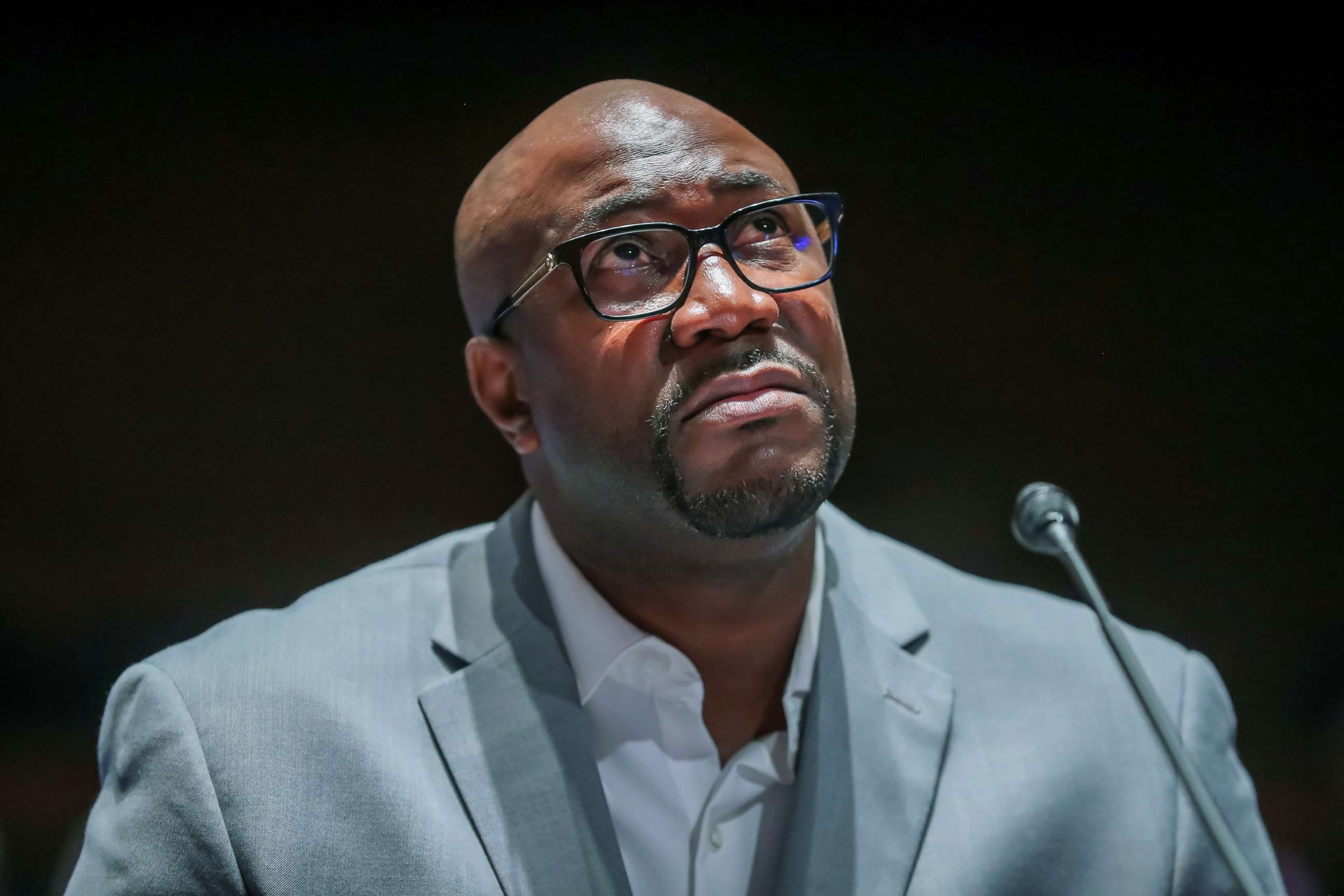
Floyd noted that while the world knows him as George, he knew his brother as Perry, and looking to the ceiling, he said he hoped his brother was resting -- in power -- with his mother.
"I didn't get the chance to say goodbye to Perry while he was here. I was robbed of that. But, I know he's looking down on us now. Perry, look at what you did, big brother. You're changing the world. Thank you for everything. For taking care of us when you were on Earth, and for taking care of all of us now," he said. "I hope you found mama and can rest in peace and power."
10:22 a.m. Ranking Republican Jordan gives opening statement
Ranking Member, Jim Jordan, R-Ohio, began his opening statement by expressing his sympathies to Philonise Floyd and Angela Underwood Jacobs, the sister of a Federal Protective Services officer who was killed during protests in Oakland, California.
"Mr. Floyd, the murder of your brother in the custody of the Minneapolis police is a tragedy. Never should have happened. It's as wrong as wrong can be, and your brother's killers will face justice. Ms. Underwood Jacobs, the murder of your brother by the riders in Oakland is a tragedy. It never should have happened," Jordan said.
He then shifted his focus on the divide between peaceful protests and looting, echoing the president's rhetoric, as the country has seen demonstrations for the last two weeks.
"There is a big difference between peaceful protest and looting there is a big difference between peaceful protests and violence and attacking innocent people and there is certainly a big difference between peaceful protest and killing police officers," Jordan said.
He also seized the opportunity to criticize Democrats for calls to defund the police, though Democratic leadership has largely called for reform, not a complete dismantling.
"This Congress started off with the Democrats folks on the left saying we should abolish ICE then move to we should abolish the entire department of homeland security, and now they're talking about abolishing the police," Jordan said.
10:18 a.m. Nadler gives opening statement
In his opening statement, Nadler outlined what he said is the reality for many black men in America and acknowledged protesters currently demanding change.
"We are all familiar with the terrifying words, 'I can't breathe.' They were uttered in Minneapolis by George Floyd, while a police officer pinned a knee to his neck. For a chilling eight minutes and 46 seconds, taking from him the final breath of life.
"Six years ago, Eric Garner uttered those exact same fateful words while locked in a chokehold in New York City. He, too, died at the hands of law enforcement.
"Millions of Americans now call out I can't breathe as a rallying cry in the streets, all across our country, demanding a fundamental change in the culture of law enforcement and meaningful accountability for officers who commit misconduct," Nadler said. "Today, we answer their call."
"African Americans are more than twice as likely to be shot and killed by police. Each year, and black men between the ages of 15 and 34 are approximately, 10, times more likely to be killed by police than other Americans. This outrage is a reality," Nadler said.
"I want to make clear at the outset that the bill is not an indictment of all police officers," Nadler emphasized. "But there are many too many officers who abuse their authority. And we cannot be blind to the racism and injustice that pervades far too many of our law enforcement agencies and injustice that the nation is demanding that we enact meaningful change. This is a systemic problem that requires a comprehensive solution."
Before concluding, Nadler directly addressed Floyd's brother, Philonise.
"We must remember that he is not just a cause a name to be chanted in the streets. He was a man. He had a family. He was known as a gentle giant.
He had a rich life that was taken away from him far too early. And we mourn his loss," Nadler added.
"We have lost George Floyd, Breonna Taylor, and the many, many other victims of excessive force by law enforcement. We must act today to honor their memory," he said.
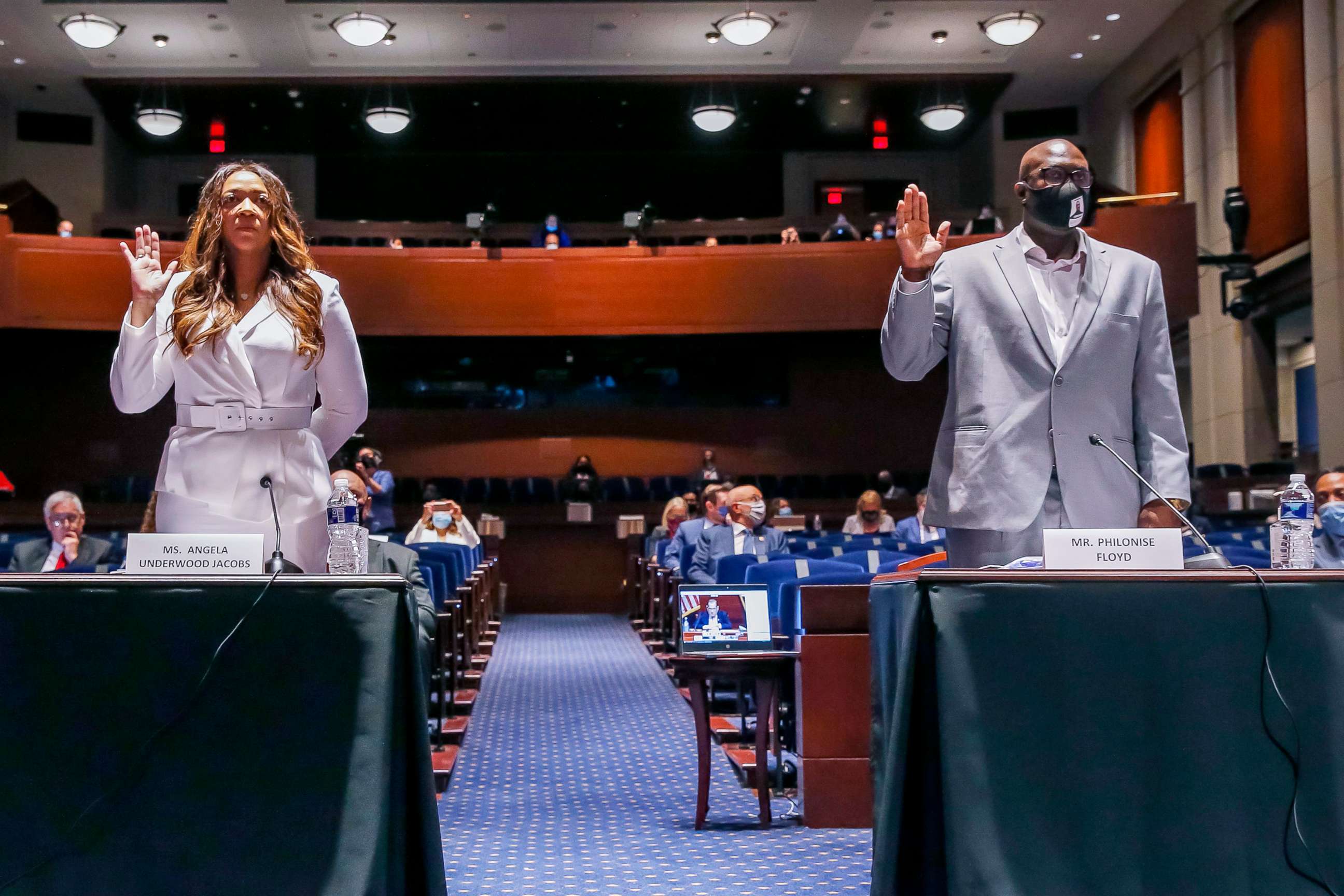
10:08 a.m. Nadler says everyone must keep masks on as he gavels in hearing
Philonise Floyd is wearing a mask as he sits at the witness table.
Though the hearing is taking place in the larger auditorium of the Capitol Visitors Center instead of the usual House Judiciary Committee room, there was little social distancing before the hearing started, with many participants visiting on the floor, including House Speaker Nancy Pelosi.
Chairman Nadler has asked that everyone present keep their masks on at all times, unless speaking, citing public health reasons.
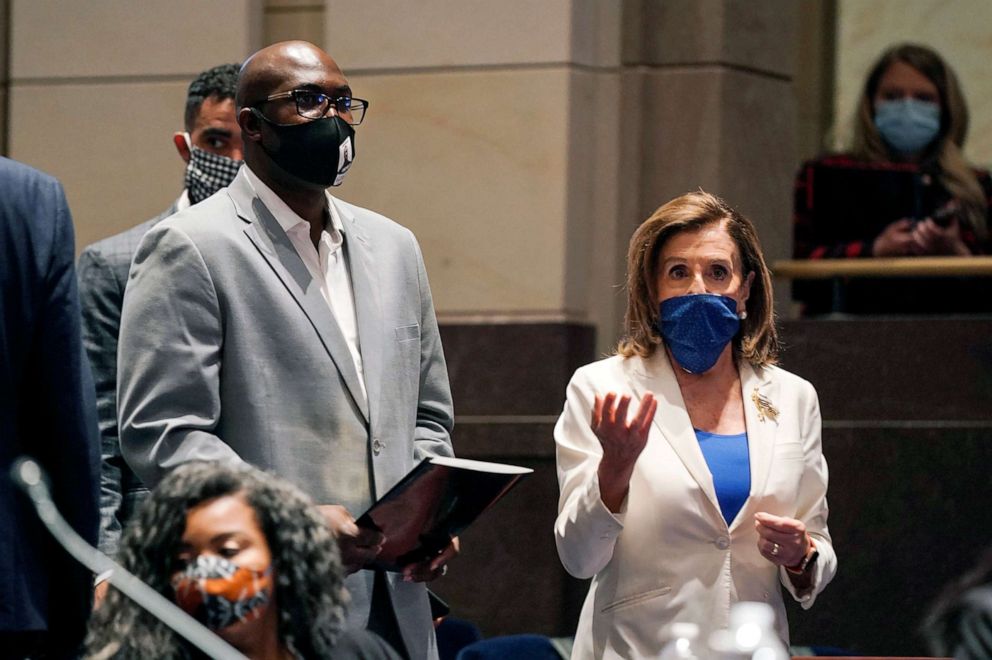
10 a.m. Emotional, political hearing on policing reform about to get underway
A few moments before the hearing got underway, House Judiciary Chairman Jerry Nadler, D-N.Y., signaled to reporters its high stakes, noting public pressure and partisan politics.
"There's going to be very heavy pressure from the American people. I hope the Republicans will be responsive to that pressure, but we must have real reform, real change and frankly, anybody who stands in the way is going to get bulled over."
Though the hearing is taking place in the larger auditorium of the Capitol Visitors Center instead of the usual House Judiciary Committee room, there was little social distancing before the hearing started, with many participants visiting on the floor, including House Speaker Nancy Pelosi. Nadler asked that everyone present keep their masks on at all times, unless speaking, citing public health reasons.
Earlier this week, Democratic leaders introduced a sweeping police reform package on Monday aimed at improving accountability and police training. It would ban police chokeholds, and also require states to gather data on police misconduct, among other provisions.
Republicans have invited three witnesses to Wednesday's hearing, including Dan Bongino, a former Secret Service agent and conservative pundit frequently quoted by President Donald Trump, Darrell Scott, a pastor who served an adviser to Trump's 2016 campaign and several White House advisory councils. Angela Underwood Jacobs, a former congressional candidate and a city council member in Lancaster City, California, and the sister of a Federal Protective Services officer who was killed during protests in Oakland, California, is also expected to testify.
Trump, who has called for justice for Floyd since his death, has also criticized protesters and pledged to support "law and order."
He floated a baseless conspiracy theory on Twitter Tuesday, suggesting that one protestor in Buffalo, New York, hospitalized after being pushed to the ground by police officers, was an "ANTIFA provocateur," a comment widely condemned by Democrats and many Republicans.
Trump and Republicans have also used some activists' calls to "defund the police" -- a push generally calling for the reallocation of some police funds to other social services -- to criticize Democrats, though party leaders have made clear that they oppose the idea.
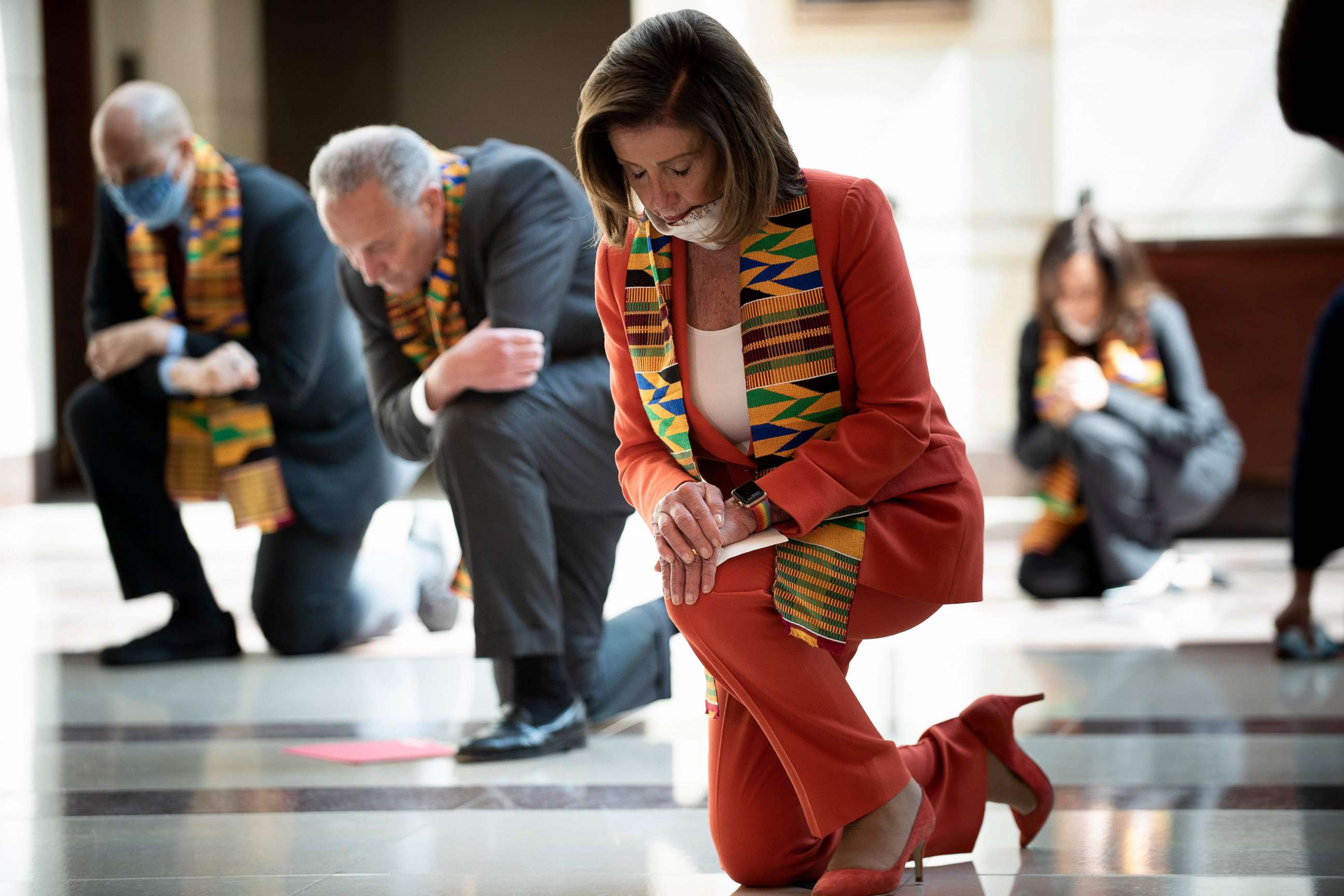
Congressional Republicans are also working with the White House on their own policing reform measures that could improve training and data collection on misconduct, though the details of the proposals have not been finalized.
Senate Judiciary Chairman Lindsey Graham, R-S.C., has scheduled a hearing next week on policing reform, telling reporters that he has told his members to "think big" in terms of witnesses.
ABC News' Mariam Khan and John Parkinson contributed to this report.




